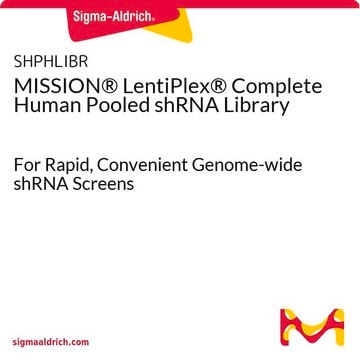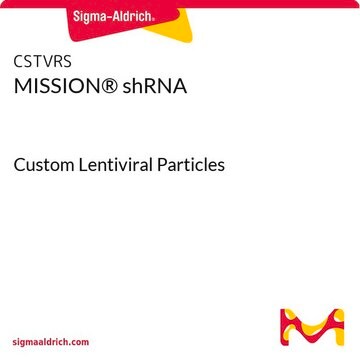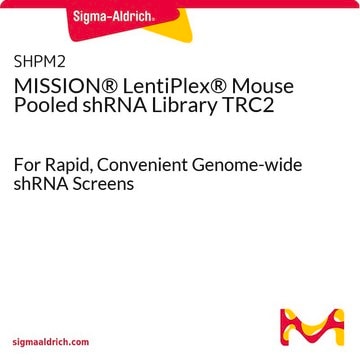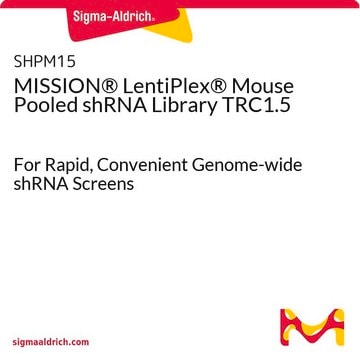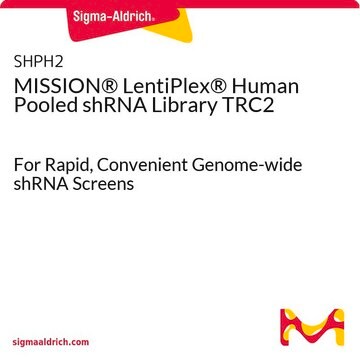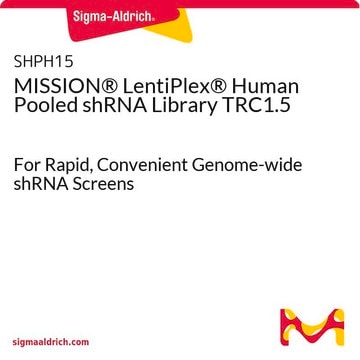SHPM01
MISSION® LentiPlex® Mouse Pooled shRNA Library
For Rapid, Convenient Genome-wide shRNA Screens
About This Item
Recommended Products
Quality Level
product line
MISSION®
concentration
≥5x108 VP/ml (via p24 assay)
technique(s)
capture ELISA: 5 × 108 TU/mL using p24
shipped in
dry ice
storage temp.
−70°C
Related Categories
General description
The MISSION LentiPlex Mouse shRNA Pooled Library is a genome-wide lentiviral pool produced using a proprietary process. The library consists of over 75,000 shRNA constructs from the TRC collection targeting 15,000+ mouse genes. Each library is tested for shRNA representation before product release to ensure robust library coverage. The library is provided in ready-to-use lentiviral format at titers of at least 5 x 108 TU/ml via p24 assay and is pre-divided into ten subpools of approximately 8,000 shRNA constructs each. Amplification and sequencing primers are also provided for downstream target identification.
The library is pre-divided into ten subpools of approximately 8,000 shRNA constructs each. Each library is enough material for six screens at 100X representation.
Please visit sigma.com/lentiplex to learn more and see example data and uses.
Other Notes
Sigma′s deconvolution service lets you easily identify the genes that impact your pooled shRNA screen.
- Next-generation sequencing of clonesgives a precise number of individual clone occurrence within a pooled shRNA sample
- Comprehensive, reproducible results from pooled shRNA screens
- Statistically robust and information-rich data
MISSION custom pooled viral shRNA libraries
Pooled shRNA RNAi screening approaches are fast becoming an economical alternative for cell based screens. MISSION RNAi is now offering custom pooled shRNA viral libraries. Just give us your list of genes or pick a gene set and leave the rest to us!
Contact your local Sigma sales representative for more information or submit an inquiry to MISSION RNAi
Legal Information
Storage Class Code
12 - Non Combustible Liquids
WGK
WGK 3
Flash Point(F)
Not applicable
Flash Point(C)
Not applicable
Regulatory Listings
Regulatory Listings are mainly provided for chemical products. Only limited information can be provided here for non-chemical products. No entry means none of the components are listed. It is the user’s obligation to ensure the safe and legal use of the product.
Cartagena Act
Cartagena Act Listed
JAN Code
SHPM01-1SET:
Choose from one of the most recent versions:
Certificates of Analysis (COA)
Sorry, we don't have COAs for this product available online at this time.
If you need assistance, please contact Customer Support.
Already Own This Product?
Find documentation for the products that you have recently purchased in the Document Library.
Articles
Presenting an article on Pooled Lentiviral shRNA Screens to Identify Essential Cancer Pathways
RNAi Consortium (TRC): Collaborative effort among academic labs and biotech/pharma institutes advancing RNA interference research.
Our team of scientists has experience in all areas of research including Life Science, Material Science, Chemical Synthesis, Chromatography, Analytical and many others.
Contact Technical Service